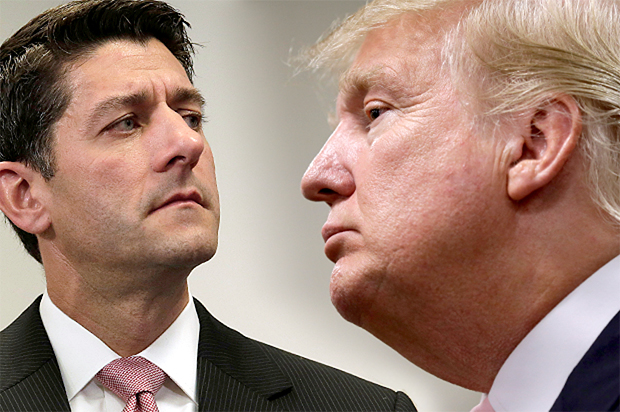Today’s the big day: presumptive Republican presidential nominee Donald Trump and Speaker of the House Paul Ryan are going to meet to discuss… stuff. Ryan pointedly refused to endorse Trump on CNN last week, explaining that Trump still has to “unify” the party and reassure the party establishment that he actually cares about cutting taxes for rich people and slashing entitlement spending. Trump shrugged it off, saying he’d appreciate Ryan’s endorsement, “but if he doesn’t want to support me that’s fine.”
The two men have never really had a pleasant public relationship, and they occupy two very different spheres of the GOP: Ryan is chief of the supply-side wing of the party that wants to redistribute wealth upwards while cheerfully hacking the safety net to bits; and Trump is generalissimo of the seething mob that wants to kick out the immigrants and claw back all the jobs from China. The purpose of today’s meeting is to figure out where and how those spheres overlap.
Not to spoil the surprise, but the answer is: they don’t, at least not in a way that’s workable. From a policy standpoint, Trump is either determinedly ambiguous or in direct opposition to some of the key components of the Ryan agenda. He’s squirrely and non-committal on taxes, and he refuses to make cuts to Social Security or Medicare. And as Josh Marshall writes, Trump has popularized an extreme and authoritarian style of politics that “so far been outside the realm of at least national GOP candidates and puts a lot of the constitutional framework of government under pretty clear strain. It also puts the GOP in a pretty much open embrace of white racial backlash.” There are, of course, elements within the party who already happily subscribe to those ideas, but none have the power and influence of Paul Ryan, who now has to figure out how to make the best of a politically fraught situation.
As the Washington Post reports, the goal for Ryan seems to be to zoom the lens so far out that the distance between the two men seems smaller than it really is. “A friend of Ryan’s told The Washington Post that Ryan would not demand Trump agree to his specific vision for entitlements, but rather would search for common ground on broader questions of principle.” Even there the ground is still tremendously shaky, given that Trump has no real principles – or, rather, none that he won’t shed the moment it becomes advantageous.
Another thing to remember is that Trump has no loyalty or debts to the Republican Party establishment. On CNN last week, Ryan congratulated Trump on becoming the presumptive nominee but also said that Trump “inherited something very special. That’s very special to a lot of us. This is the party of Lincoln, of Reagan, of Jack Kemp. And we don’t always nominate a Lincoln and a Reagan every four years, but we hope that our nominee aspires to be Lincoln and Reagan-esque.” Ryan’s professional life has been spent within the GOP. He has a reverent view of his party and cares about its long-term health. Trump has none of that. His ascent was powered by popular will and brute force, and he completed it despite opposition from the party establishment. “I didn’t inherit [the GOP],” Trump tweeted in response to Ryan, “I won it with millions of voters.”
As such, Trump has no actual reason to care too much about demands and conditions from Ryan or any other Republican elite. He has the voters on his side, so he can make the case that they should be the ones to accommodate him. If the party balks at embracing Trumpism and division persists, then he’ll lose the election in November and will happily go back to being a celebrity businessman while the party tears itself asunder. Ryan and his cohorts are thinking about the future of their political movement, but Trump is thinking about Trump.
So all this talk about “unity” is largely for show, and it puts the speaker in an extraordinarily difficult situation. Ryan is thinking long-term and positioning himself to reshape the party in his image once Trump is through breaking it apart, and that requires setting himself against Trump in some way. But his own members want him to get behind Trump, and Ryan himself is saying things like “we cannot afford to lose this election to Hillary Clinton,” so he’s likely to try and find some way to reconcile himself to his party’s nominee. (It’ll probably be some variation of the “lesser of two evils” argument offered up by other Trump-queasy Republicans.) Trump, for his part, will tell Ryan and any other House Republican who’s wary of supporting him whatever they need or want to hear, and once he has their support he’ll blow off whatever commitment he made and continue on as if nothing has changed.

